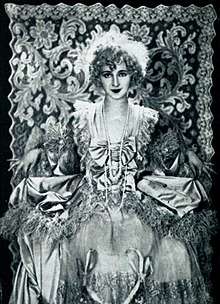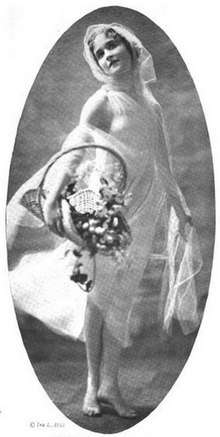Florence O'Denishawn
Florence O'Denishawn (born Florence Andrews, July 21, 1897 – March 15, 1991), was an American actress and model, and one of the first group of dancers associated with the Denishawn school.
Florence O'Denishawn | |
|---|---|
 Florence O'Denishawn, from a 1922 publication | |
| Born | Florence Andrews July 21, 1897 Shreveport, Louisiana, U.S. |
| Died | March 15, 1991 (aged 93) New York City, New York, U.S. |
| Nationality | American |
| Occupation | Dancer, Actress |
Early life

Florence Andrews was born in Shreveport, Louisiana,[1][2] the daughter of a banker.[3] She studied dance with Ted Shawn and Ruth St. Denis in their "Denishawn" school in California.[4][5] When she became a professional dancer, she wanted to be billed as "Florence of Denishawn", but the name became "Florence O'Denishawn" in a printing error,[6] and she continued working under that version.[7]
Career
O'Denishawn's stage credits included Hitchy-Koo (1918-1920),[1] Ziegfeld Follies of 1921,[8] Rose Briar (1922), Music Box Revue (1923),[9] and Honeymoon Lane (1926).[10] Of her appearance in Music Box Revue, critic George Jean Nathan noted that her "umbilical revelations are so familiar by this time that one wishes she would put on a dress."[11] She was cast in two silent films, Lawful Larceny (1923)[12] and Monsieur Beaucaire (1924), in the latter dancing with Rudolph Valentino.[13] In 1925, she headlined a vaudeville shows in New York and Baltimore, with dancers Nelson Snow and Charles Columbus.[14][15] She toured with Snow and Columbus in 1927 and 1930[16]
O'Denishawn posed for photographer NIckolas Muray,[17] and for sculptor Harriet Whitney Frishmuth.[18][19] She posed for two bronze statues by Frishmuth, named "Papillon" and "Scherzo", which were commissioned by Wilbur Foshay for Foshay Tower.[20]
O'Denishawn gave a celebrity endorsement to a brand of footcare plasters.[21] In 1926, she performed at a benefit show for the Episcopal Actors' Guild.[22] In 1927 she performed in another benefit show, dancing at a midnight cabaret to raise funds for the Association for the Aid of Crippled Children.[23] She danced for a cause again in 1930, at a variety show to benefit the Bide-A-Wee Home for Animals.[24]
O'Denishawn embarked upon the study of aviation in 1927, saying "there is nothing that can beat an aeroplane for grace."[25] From the late 1930s into the 1950s, O'Denishawn worked in shops, running her own store in Greenwich Village,[26] and as head of the lingerie department at Porter's department store on Madison Avenue.[27][28]
Opinions
O'Denishawn spoke about "prudery" and artistic expression, saying "There is no mental health in a nation that is afraid to trust itself in the presence of the nude."[29] In 1928, O'Denishawn decried popular dances like the Charleston or the Black Bottom with blatant racism, saying "Dances that are admittedly of a barbaric origin — the shimmy, Charleston, and others — are proving an insidious evil in the way of depriving our American women of their natural grace and movement," further explaining that "Negro anatomy is not the same as ours. The pose of the knees, the modelling of the hips, the line of the feet makes those dances right for the Negro" but not for white dancers.[30]
Personal life
O'Denishawn died in 1991, aged 93 years, in New York. There is a file of her correspondence with Ted Shawn, in the Jacob's Pillow Dance Festival archives in Becket, Massachusetts.[31]
References
- "In the Spotlight: Florence O'Denishawn". Theatre Magazine. 28: 20. July 1918.
- "The Facts About Miss O'Dennishawn". New York Times. April 10, 1927. p. X4 – via ProQuest.
- Kendall, Elizabeth (1984-01-01). Where She Danced: The Birth of American Art-dance. University of California Press. p. 154. ISBN 9780520051737.
- Jowitt, Deborah (1989-01-01). Time and the Dancing Image. University of California Press. p. 145. ISBN 9780520066274.
- Shawn, Ted. Ruth St. Denis. Рипол Классик. pp. 91–92. ISBN 9785876412140.
- "Actress' Irish Name Result of Printer's Error". The Buffalo Enquirer. March 20, 1919. p. 7. Retrieved April 7, 2019 – via Newspapers.com.
- Cullen, Frank; Hackman, Florence; McNeilly, Donald (2007). Vaudeville old & new: an encyclopedia of variety performances in America. Psychology Press. pp. 307–308. ISBN 9780415938532.
- "Shreveport Girl Premier Danseuse, Due to Ted Shawn". The Times. October 31, 1921. p. 3. Retrieved April 7, 2019 – via Newspapers.com.
- "The Theatre". Time. 2: 16. October 1, 1923.
- Dietz, Dan (2019-04-10). The Complete Book of 1920s Broadway Musicals. Rowman & Littlefield. pp. 73–74, 323–324. ISBN 9781538112823.
- Nathan, George Jean (October 20, 1923). "Glorifying the American Tired Business Man". The Judge. 85: 17.
- "Lawful Larceny". Photoplay. 24: 117. October 1923.
- "Florence O'Denishawn in 'Monsieur Beaucaire'". The Tennessean. March 16, 1924. p. 38. Retrieved April 7, 2019 – via Newspapers.com.
- "The Week in Vaudeville". The Brooklyn Daily Eagle. August 30, 1925. p. 61. Retrieved April 7, 2019 – via Newspapers.com.
- "Dancer Heads Bill at Two-a-Day". The Baltimore Sun. August 16, 1925. p. 42. Retrieved April 7, 2019 – via Newspapers.com.
- "Nelson Snow, Dancer, Dies". The New York Times. January 24, 1931. p. 19 – via ProQuest.
- "Winter Interludes Which are Instinct with Grace and Rhythm". Vanity Fair. 20: 42. December 1923.
- Flanagan, Barbara (February 6, 1976). "Old Bookshop Has New Home". The Minneapolis Star. p. 21. Retrieved April 7, 2019 – via Newspapers.com.
- Flanagan, Barbara (June 25, 1982). "Vandal Tumbles Sculpted Bronze Beauty from Pedestal at Charlie's". Star Tribune. p. 33. Retrieved April 7, 2019 – via Newspapers.com.
- Flanagan, Barbara (August 30, 1979). "Woman Behind Foshay's Nudes Never Met Him". The Minneapolis Star. p. 33. Retrieved April 7, 2019 – via Newspapers.com.
- "Advertisement, Blue Jay plasters". Arizona Republic. May 12, 1926. p. 12. Retrieved April 7, 2019 – via Newspapers.com.
- "Actors' Guild Holds Benefit". The New York Times. November 21, 1926. p. X14.
- ""Rainbow Ball Tonight"". The New York Times. April 22, 1927. p. 12 – via ProQuest.
- "Bide-A-Wee Benefit has 'Variete' Program". The New York Times. April 26, 1930. p. 26 – via ProQuest.
- "Untitled news item". The Cincinnati Enquirer. June 5, 1927. p. 65. Retrieved April 7, 2019 – via Newspapers.com.
- Hughes, Alice (June 7, 1938). "A Woman's New York". The Star Press. p. 7. Retrieved April 7, 2019 – via Newspapers.com.
- "Untitled news item". Daily News. September 28, 1955. p. 82. Retrieved April 7, 2019 – via Newspapers.com.
- Roe, Dorothy (September 30, 1956). "Ziegfeld Follies Girls Pop Up in Varied Places". The Crowley Post-Signal. p. 4. Retrieved April 7, 2019 – via Newspapers.com.
- "Artist Renaissance is Foreseen by Dancer". The Evening Sun. August 20, 1925. p. 22. Retrieved April 7, 2019 – via Newspapers.com.
- "Vogue of Present Barbaric Dances an Insidious Evil, Believes Star". The Courier-Journal. March 4, 1928. p. 25. Retrieved April 7, 2019 – via Newspapers.com.
- "Jacobs Pillow Archive: File: Florence "Flossie" O'Denishawn [Florence "Flossie" O'Denishawn 54 ]". archives.jacobspillow.org. Retrieved 2019-04-07.
External links
| Wikimedia Commons has media related to Florence O'Denishawn. |
- Florence O'Denishawn on IMDb
- Florence O'Denishawn at the Internet Broadway Database
- A 1917 photograph of Florence O'Denishawn, in the Jerome Robbins Dance Division of the New York Public Library Digital Collections.
- Photographs of Florence O'Denishawn available at Getty Images.